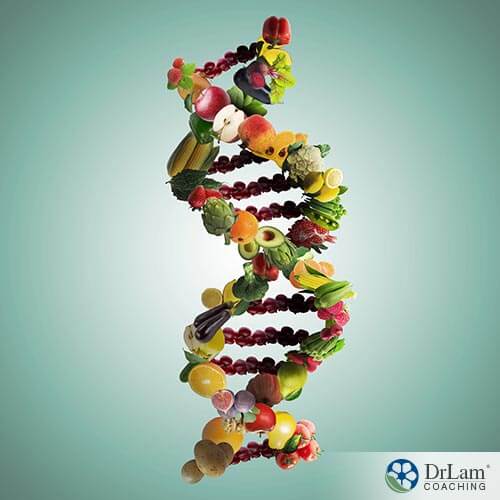Most of the time when you think about nutrition, you think about carbs, proteins, and fats. Diets tend to be built around these macronutrients. But in reality, a lot of thought should go toward micronutrients and the connection between genetics and nutrition.
 Micronutrients consist of essential vitamins and minerals that often go overlooked in your diet. Clearly, the macronutrients in your diet play a large role in keeping you healthy. However, micronutrients play an even greater role in keeping you alive.
Micronutrients consist of essential vitamins and minerals that often go overlooked in your diet. Clearly, the macronutrients in your diet play a large role in keeping you healthy. However, micronutrients play an even greater role in keeping you alive.
Because these micronutrients get overlooked, the majority of people suffer from a deficiency of them.
These nutrients come from your diet because not many of them come from your own natural processes. The Recommended Daily Allowance for each of them only assures you get enough so you don’t get sick and die.
One of the major consideration in the connection between genetics and nutrition is looking at the long-term effects of not getting enough of these micronutrients. Many of the metabolic pathways in the body require micronutrients. A large number of these pathways prove essential for short-term survival. For example, magnesium is required to produce energy. Without energy, you do not survive. But in long-term considerations, magnesium also repairs DNA damage. DNA damage doesn't particularly affect you in the short-term, but many years later the DNA damage not repaired by magnesium may result in mutations that can lead to cancer.
The connection between genetics and nutrition becomes very clear when you consider how genes affect the processes of absorption, metabolism, receptor action in cells, and excretion. Everyone has certain differences in how enzymes operate in the body and how these affect nutritional requirements. These inborn differences also play a part in how genetics and nutrition interact. Also, the differences affect individual tastes in foods and thus nutrition.
A relatively new field of study, nutrigenetics combines the studies of genetics and nutrition. One of the primary aims of nutrigenetics is to determine how a person’s genetic makeup affects his or her ability to utilize a particular nutrient. A so-called thrifty genetic trait might predispose a person to gain weight rapidly from a diet too high in fats. This greatly increases that person’s risk of developing Type 2 diabetes.
This new field works with genetic variations, called gene polymorphisms, that determine the way certain proteins process nutrients in different ways. This means too much or too little of certain foods, including micronutrients, can lead to problems in some people.
Another example of how this works involves women with too little folic acid, one of the B vitamins, and the variant gene 677TT MTHFR who may have an increased risk of their babies being born with spina bifida.
 Inflammation plays a major role in the development of chronic illness conditions such as cardiovascular disease, obesity, and diabetes mellitus. Therefore, it is essential to understand how inflammation develops.
Inflammation plays a major role in the development of chronic illness conditions such as cardiovascular disease, obesity, and diabetes mellitus. Therefore, it is essential to understand how inflammation develops.
Epigenetics involves the study of how people experience changes due to genes turning on or off rather than through changes in their genetic code. Studying epigenetic processes may offer a way to understand the development of inflammation processes.
In addition, these epigenetic changes appear to serve as a link between the risk of developing illness conditions and environmental influences. Also, changes due to epigenetics appear to affect the differentiation of immune cells which plays a major role in the inflammatory process. There is evidence to suggest that changes in DNA sequences due to epigenetic processes may transfer to later generations of cells.
In the same vein, the changes brought about by epigenetic processes appear dynamic and potentially reversible. Because of this, they also appear modifiable by lifestyle changes and other therapeutic attempts. Genetic variations do not hold these characteristics.
An example of the results of epigenetic study involves the connection between trauma and the development of Post-Traumatic Stress Disorder (PTSD). Research indicates the AIM-2 gene to be influenced by trauma in the development of inflammation.
Stress triggers the activation of AIM-2 gene. This leads to the production of C-reactive protein (CRP) which plays a major role in how you respond to inflammation. When stress is present, CRP levels rise in the bloodstream. This strongly suggests trauma causes the AIM-2 gene to turn on. If a person experiences stress with a low CRP level, it suggests a failure of the AIM-2 gene to turn on, or possibly another genetic mutation. This leaves the person at higher risk of developing PTSD.
Stress also plays a major role in the development of AFS. When stress hits your body, it activates the hypothalamic-pituitary-adrenal (HPA) axis. At the end of this axis, the adrenal glands become stimulated to release cortisol, the stress-fighting hormone, to fight the effects of stress. Over time and with increasing stress, the adrenals become fatigued and unable to produce sufficient cortisol. At this point, symptoms of AFS begin. Through several stages, each more serious than the last, these symptoms grow to the point of debilitation of the person.
Once the adrenals become fatigued another set of organs and organ systems, the NEM stress response becomes activated to assist in dealing with stress. Six circuits made up of three organs or organ systems each in an overlapping fashion make up the NEM system. This spreads the action of responding to stress among six systems rather than only one.
 In order to understand the relationship of AFS and the NEM to genetics and nutrition, a discussion of some of the specific micronutrients, their benefits, and symptoms of deficits follows.
In order to understand the relationship of AFS and the NEM to genetics and nutrition, a discussion of some of the specific micronutrients, their benefits, and symptoms of deficits follows.
This fat-soluble vitamin, also known as retinol is found in food sources that contain beta carotene. Vitamin A helps maintain healthy skin and the mucous membranes of the digestive and respiratory systems. Also, it fights infection and boosts your immune system.
Large doses of vitamin A can lead to a toxic buildup over time. Too little of the vitamin leads to vision problems, including blindness, increased infections, and increased risk of death.
Its relationship to AFS, a lack of vitamin A could affect the lining of the gut system and contribute to leaky gut. A lack also could contribute to a weakened immune system which could prove inadequate to handle a great influx of pathogens through a leaky gut. This can lead to a hyperactive immune response in an effort to deal with this multitude of pathogens. Such a situation sets the stage for the development of autoimmune conditions.
A variation in the genes CRBPll and BCMO1 may leave the person unable to properly convert beta carotene into vitamin A. Such a variation would mean the person must consume foods rich in retinol in order to prevent a deficit in vitamin A.
The B vitamins consist of a series of vitamins necessary for good health. These vitamins carry the designation of building blocks to good health. The relationship between genetics and nutrition is highlighted in research into these vitamins. Especially if you have MTHFR gene mutations.
It helps your body change carbs into energy. You need this vitamin for the proper use of all of the B vitamins. Also called thiamin, a deficiency of this vitamin leads to chronic fatigue. Thus it appears implicated in AFS for which ongoing fatigue becomes a major symptom. With too low levels of B1, your immune system essentially does not work.
The gene FUT2 stimulates a protein involved in the presence of H. pylori in the mucus membrane of your gastrointestinal system. The H. pylori inhibit the absorption of B12 in your gut. Thus, this gene appears responsible for low levels of B12 in your body.
Another gene, TCN2 encodes another protein that enables B12 to transfer from the blood into your cells. A variant of this gene leads to low levels of B12 in the blood and high homocysteine levels. Increased levels of homocysteine lead to increased risk of cardiovascular disease.
Low levels of B vitamins often lead to anemia, fatigue, shortness of breath, tingling in the feet, and memory loss. These symptoms all come with AFS, also. This indicates a deficit in the vitamin B complex in those suffering from AFS.
 Because vitamin C is water-soluble, your body can only store a small amount. Thus, it must come from dietary sources. Low levels of vitamin C increase the risk of cancer, cardiovascular disease, and diabetes. Your genetic makeup also plays a part in the level of vitamin C in your body. If you have the deletion variant of gene GSTT1, you will have more difficulty processing vitamin C from your food. The insertion variant of this gene allows for better processing of this vitamin from food.
Because vitamin C is water-soluble, your body can only store a small amount. Thus, it must come from dietary sources. Low levels of vitamin C increase the risk of cancer, cardiovascular disease, and diabetes. Your genetic makeup also plays a part in the level of vitamin C in your body. If you have the deletion variant of gene GSTT1, you will have more difficulty processing vitamin C from your food. The insertion variant of this gene allows for better processing of this vitamin from food.
Symptoms of low vitamin C include fatigue, depression, slower wound healing, and defects in connective tissue. Fatigue and depression commonly appear in those with AFS, also. This suggests a deficit in this vitamin either contributing to or coming from AFS.
Not ordinarily thought about, this vitamin plays an important role in working with vitamin D and calcium to increase the absorption of both. It also aids in the transport of calcium into the bones. Of interest to those dealing with AFS, this vitamin helps greatly in decreasing inflammation, lowering insulin resistance, aiding mitochondrial function, and helping autoimmune conditions.
Essential minerals play an important role in the field of genetics and nutrition. A seldom-considered micronutrient, manganese proves beneficial for antioxidant enzyme functioning, fighting the damage caused by diabetes, lung support, and weight loss. Symptoms of low manganese include weak bones, anemia, chronic fatigue, decreased immune functioning, hormonal imbalance, and impaired glucose sensitivity.
The gene SLC39A14 can either balance or disrupt manganese levels. If a person has the gene PARK9 may react to manganese with Parkinson-like movements.
Deficits in chromium bring on poor glucose control, bone loss, poor skin health, increased risk of problems with cholesterol, and poor concentration. Sufficient levels of chromium aids in the regulation of glucose transport.
The gene MYF1 is most often associated with chromium levels.
This micronutrient, like chromium, affects genes more than genes affect it. It regulates the phosphorylation of Smad 1,5, and 8. It also affects the expression of Bmp6, idl, and Atoh8.
Symptoms of low iron include fatigue, unexplained anxiety, irregular heartbeat, frequent headaches, and heavy menstrual flow.
Thirteen genes contribute to the utilization of CoQ10. Some of those genes are PDSS1, 2 along with CoQ2,4,6 and ADCK3.
This micronutrient benefits cardiac function, increases energy, helps cognitive function, and fights free radicals.
Symptoms of too little CoQ10 include fatigue, muscle weakness, high blood pressure, chest pains, heart failure, and seizures.
The benefits from these micronutrients include decreased inflammation, prevention of cancer, increased cardiac health, anti-ageing properties, decreased symptoms of metabolic syndrome.
Symptoms of too low omegas in the body include joint problems, poor mood control, sleeplessness, poor attention and concentration, lowered energy, and irritability.
 The connection between genetics and nutrition becomes increasingly clear on a daily basis. Current research shows that this relationship works both ways. Few people may not benefit from all the nutrients in the food they consume, and perceive the taste of food, due to their genetic makeup.
The connection between genetics and nutrition becomes increasingly clear on a daily basis. Current research shows that this relationship works both ways. Few people may not benefit from all the nutrients in the food they consume, and perceive the taste of food, due to their genetic makeup.
This relationship between genetics and nutrition also carries implications for AFS. Most people do not get a sufficient level of micronutrients from their diet. Those with AFS will likely suffer from additional deficiencies of micronutrients.
These deficiencies may cause many of the symptoms of AFS such as fatigue, metabolic issues, blood pressure problems, and poor mood control, among others.
The best thing to do to make certain you get the micronutrients you need involves eating the right foods.
Foods that supply micronutrients can be found on an internet search. Keep in mind that vegetarian or vegan diets often put you at increased risk for deficiencies in micronutrients. This means supplementation becomes necessary.
Please make sure you consult your healthcare provider to determine the best way to improve your levels of micronutrients.
If you want to know more about or need assistance with the state of your genetics and nutrients, the team at Dr Lam Coaching can help. We offer a free**, no-obligation telephone consultation at +1 (626) 571-1234 where we will privately discuss your symptoms and various options. You can also send us a question through our Ask The Doctor system by clicking here.
Genetics and nutrition are related in that each affects the other. What you eat often is determined by your taste which is determined by genetics. Some micronutrients affect genes more than genes affect them. How you use nutrients is greatly determined by genetic factors.
